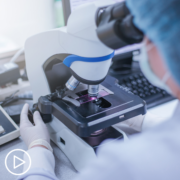Tag Archive for: SCLC
Expert Advice for Patients With Small Cell Lung Cancer
Expert Advice for Patients With Small Cell Lung Cancer from Patient Empowerment Network on Vimeo.
Dr. Triparna Sen, a leading small cell lung cancer (SCLC) researcher and expert, shares key advice for patients. Dr. Sen stresses the importance of working closely with your doctor, asking about clinical trials options, and the benefits of support groups.
Dr. Triparna Sen is an associate professor in the department of oncological sciences and co-director of the Lung Cancer PDX Platform at the Icahn School of Medicine at Mount Sinai in New York. Learn more about Dr. Sen.
See More from Thrive Small Cell Lung Cancer
Related Resources:

|

Advances in Small Cell Lung Cancer Research | Hope for the Future |

|
Transcript:
Katherine:
What three key pieces of advice would you have for a patient who has just been diagnosed with small cell lung cancer?
Dr. Sen:
First of all, I would like to say definitely, definitely work with your physician. They are trying to do their best for you. Work with your physician. Follow the treatment regimen that they give. Ask about clinical trials that you are eligible for and that you can enroll into. Then, of course, having a support group. So, there are many patient advocacy groups right now for non-small cell and small cell lung cancer.
I think being a part of such a patient advocacy group where you have people going through the same journey, I think, it really helps. It helps you sort of manage your disease better. It helps you stay hopeful when you hear about other people’s sort of prognosis and if they have durable benefits from drugs. So, I think having a support group is very important. If there is an ability for you to contribute to research in terms of giving blood or tissues, if your physician is saying that you could be eligible for that, I think a contribution to research is really key.
Because looking at the disease mechanisms in the clinical tissue is sort of where for us it is absolutely golden. We go there. We look at the disease mechanisms and tissues. If there is an opportunity for you, then I think it should definitely be explored.
Finally, I would like to say we are really trying as researchers to really understand the disease better. We’re trying to do that better. I hope and I pray that we go faster with it. But I think there is hope right now for patients with small cell lung cancer. The research is really progressing better. There are many clinical trials.
So, I think stay hopeful and have a peer support group who can take you through this quite difficult journey.
Katherine:
Why should patients consider consulting with a lung cancer specialist?
Dr. Sen:
I think it’s crucial because these lung cancer specialists really know the current state of the art treatments. They are thought leaders. They participate in trials. They actually sit on advisory boards with companies.
They are strategizing the entire treatment landscape for this disease. So, if you go to a lung cancer specialist, you’re more likely to get the most updated knowledge about what treatments are out there, what you qualify for, what are the clinical trials out there, and what are working in patients. This is not just for small cell. There are many, many trials that are happening in non-small cell also. So, whatever your diagnosis is, a specialist should be able to tell you what your options are. You really want to know about your options. Your options about biomarker testing.
Your options about screening. Your options about trials. I think a lung cancer specialist can really guide you towards that.
Katherine:
Dr. Sen, thank you so much for joining us today. It’s been a pleasure speaking with you.
Dr. Sen:
Thank you.
Advances in Small Cell Lung Cancer Research | Hope for the Future
Advances in Small Cell Lung Cancer Research | Hope for the Future from Patient Empowerment Network on Vimeo.
What new treatments are being studied for small cell lung cancer (SCLC)? Dr. Triparna Sen, a leading researcher in the field, shares promising updates, including advances being made with LSD1 inhibitors, DDR (DNA Damage Response) inhibitors, and DLL-3 targeted therapies.
Dr. Triparna Sen is an associate professor in the department of oncological sciences and co-director of the Lung Cancer PDX Platform at the Icahn School of Medicine at Mount Sinai in New York. Learn more about Dr. Sen.
See More from Thrive Small Cell Lung Cancer
Related Resources:

|

|

|
Transcript:
Katherine:
Dr. Sen, you are a leading researcher in the field. What is the latest research news that you can share with us about small cell lung cancer?
Dr. Sen:
There’s a lot of great research going on in my lab and labs all across the world. I think for the first time in a very long time, we are really trying to dissect the biology of small cell.
It has been a research in making for many years. I think we have now really come to a point where we are really trying to understand the disease. I’ll go into a little more about the questions you are trying to answer. So, one of the main questions or one of the main things that kind of is a hurdle to getting durable treatment options is that the frontline chemotherapy and immunotherapy doesn’t work as well as they should even for the approved regimens, which is the chemotherapy and the immunotherapy.
The patients often do not have durable benefits. Even if patients have durable benefits, it’s only in a very minority of patient population which means in only about 10 to 15 percent of the total patient population actually do have any benefit from the frontline treatment. So, the main question that we are trying to answer is that why do these patients not respond to immunotherapy and chemotherapy in the frontline.
What are the mechanisms of resistance to chemotherapy and immunotherapy? Primary resistance, what I mean by primary resistance is that patients who never respond. The disease comes back even while they’re getting the frontline chemo. So, the primary resistance, the mechanisms. Of course, when they have acquired resistance after the maintenance regimen when they come back, why are these patients having this acquired resistance to chemotherapy and immunotherapy? Because only when we understand resistance mechanisms will we be able to then come to the combination strategies.
That’s the next area of research is that once we understand the mechanism of chemotherapy and immunotherapy resistance is then coming up with effective combination therapy. So, what should we combine with immunotherapy in order to make immunotherapy better? I’ll give you an example from the research that we did.
So, our lab focus is, as I said, on making immunotherapy better. What we understood is that there are certain epigenetic modifiers like LSD1.
Repressing these, repressing LSD1, with a small molecule inhibitor actually augments or benefits the response to immunotherapy. So now, we are looking at LSD1 inhibitors in combination with immunotherapy. That’s one area that we are focusing on. The second are that we published extensively on is DNA damage response inhibitors which really works in combination with immunotherapy and makes immunotherapy response better.
Now, we are investigating that in the lab the combination strategies of combining these DNA damage response inhibitors with immunotherapy. So, combination strategies. I think always coming up with novel targets. I will mention there are many novel targets that are right now in the clinical trials actually showing really, really encouraging data.
I’m talking about DLL3 targeted BiTEs or ADCs we have seen that are showing preliminary data. We have seen a really good really good response in patients. So, finding these targets that are very specific for small cell and that can work in these unique population of patients.
So, DLL3 targeted agents. There are agents that target B7-H3. So, we are looking at these novel targets and where they could fit in the current therapeutic regimen. Finally, since small cell lung cancer is not a surgical disease, we have to look for other options to find biomarkers. So, liquid biopsy. Liquid biopsy, what I mean by that is understanding the disease not just from tissue but also from blood.
There’s a lot of research that’s happening in understanding the biology of small cell from blood draws from these patients.
So, the field of using liquid biopsy or understanding the disease from blood draws is one of the areas that many labs, including ours, are focusing on, and how we can utilize these blood samples to then monitor the disease and also understand the resistance mechanisms to various drugs. I think these are the areas that we are investigating and seems, to me, very important areas that we need to address in order to really manage small cell lung cancer.
Katherine:
What do these advances mean for small cell lung cancer patients? Are you hopeful?
Dr. Sen:
Oh, yes. Of course. We’re always hopeful. That’s the goal, right. The goal is to have effective therapies that work and that works for a long time. That also benefits the patients in terms of quality of life which means without very severe adverse effects.
So, very hopeful. Because I think what was limiting us for all those years for the last 40 to 50 years is that we really did not understand the complexity of small cell lung cancer. It is a very complex disease. It is very different from non-small cell lung cancer which has these mutations that you can target drugs against. So, there are this EGFR mutations and KRAS mutations in non-small cell.
But small cell, it’s not that. It is not a disease where we have these GATA function mutations that we can devise therapies against. It’s a very different disease. The disease is aggressive. The disease progresses fast, and it also changes its physiology very fast. So, I think for the first time, we really are trying to understand the biology. What that helps is then to come with very informed decisions about therapy.
So, yeah, I’m very hopeful. Because I think we have now targets that we are actually seeing benefits in patients. I think the more and more we understand resistance mechanisms, we’ll also be able to manage that better.
Katherine:
That’s very promising news.
Understanding Small Cell Lung Cancer Treatment Options
Understanding Small Cell Lung Cancer Treatment Options from Patient Empowerment Network on Vimeo.
How is small cell lung cancer (SCLC) treated? Dr. Triparna Sen discusses treatment options for patients with small cell lung cancer, both first-line and second-line therapies, and the important role of clinical trials in patient care.
Dr. Triparna Sen is an associate professor in the department of oncological sciences and co-director of the Lung Cancer PDX Platform at the Icahn School of Medicine at Mount Sinai in New York. Learn more about Dr. Sen.
See More from Thrive Small Cell Lung Cancer
Related Resources:

|

|

Advances in Small Cell Lung Cancer Research | Hope for the Future |
Transcript:
Katherine:
How do test results impact care?
Dr. Sen:
So, you know, once the doctor has confirmed the small cell lung cancer and we have confirmed what stage it is at – what I mean by staging is that it could be either a limited stage disease which is an early stage small cell, or it could be an extensive stage of small cell. The treatment for those two are quite different. So, if it is an early stage or limited stage, patients are usually treated with chemoradiation. If it is an extensive stage or a metastatic small cell, then patients are usually given a standard of care which is chemotherapy in culmination with immunotherapy which is an antibody against PD-L1.
Katherine:
You’re talking about treatment options that are currently available for small cell lung cancer. What about targeted therapies?
Dr. Sen:
There aren’t very many therapeutic strategies that are targeted therapies as we speak like we hear from non-small cell lung cancer.
So currently, like I mentioned, the frontline treatment for small cell lung cancer is with chemotherapy and immunotherapy and maintenance with immunotherapy alone.
Once the patient relapses, which often is the case – all patients actually have resistance to the frontline chemo-io (chemoimmunotherapy) at some point in time. Once they have a relapse disease, the second line of therapy until now is with either topotecan or irinotecan which are two topoisomerase inhibitors or with lurbinectedin which is in the second line.
So, when it comes to targeted therapies, so far we a have seen, you know, the conventional way that we think about EGFR inhibitors or KRAS inhibitors, it hasn’t been the case so far with small cell lung cancer. It’s very limited in the current approved setting. But there are many clinical trials that are investigating several targeted therapies that are either targeting – I can speak about that more as I talk about research strategy. But there are many targeted agents that are targeting surface targets like DLL3, B7-H3, or SEZ6. There are other targets that are targeting things like DNA damage repair, proteins, or epigenetic regulators like LSD1. But so far in the approved setting, it is quite limited.
Katherine:
When we look at what therapies are available, what treatment options are available, what are some typical side effects? How are they managed?
Dr. Sen:
Some of the major side effects that you see, especially with a frontline chemo-io (chemoimmunotherapy), are very common like you see with other cancer types. Also, it’s usually myelosuppression.
I think it is prevented or is managed either by dose reduction or treatment delays or treated with transfusion. There has been research that CDK4/6 inhibitors, trilaciclib, when treated with in combination with chemotherapy can bring down the side effects that we see with chemotherapy.
Some of the immunotherapy related adverse events includes pneumonitis, colitis. They are usually treated with early steroids, treatment withholding, and also it could be leading to permanent discontinuation of the treatment if the adverse events are really severe. Those are mainly what we see we the chemo-io (chemoimmunotherapy) regimen that is given up front.
Katherine:
Okay. What questions should someone be asking about their proposed treatment plan?
Dr. Sen:
Right. So, I think, of course, first is what stage. The treatment will depend upon the stage of small cell. Usually, on the frontline, everyone is given chemotherapy and immunotherapy.
It’s a systemic therapy that’s being given. But I think the patient should be asking questions like are there clinical trials available for me. Because there are multiple clinical trials right now in the frontline and the second line setting.
So, I think definitely the patient should ask about the clinical trials that the qualify for. In terms of contributing to research, I think if there are options for them to either sign up for blood collection protocol or for tissue collection protocol, I think the patient should definitely enroll for that.
Because that really helps our research strategy. But in terms of treatment, I think they should ask about available clinical trials that they qualify for.
Katherine:
Let’s turn to clinical trials then. Patient participation, of course, is essential to finding new and better treatments. What would you say to someone who’s hesitant to participate in a clinical trial?
Dr. Sen:
Yes. I mean, that’s often the thing. We hear about these novel drugs. They’re in trial. For a disease that’s that aggressive, I think once there is a relapse, I think clinical trials could be a very good option for patients. These are novel drugs that have come out of very robust research that we do in the lab. They can often work quite a bit. So, I think, of course, talk to your physicians. Talk to them at length about whether you do qualify for it. But if there is a trial at the center that you’re getting treated at and if the doctor advises that, I think enrolling in a clinical trial could be a very good option for patients, especially in the aggressive setting where there are not many options available for patients.
As I mentioned here, research is my true north. I mean, all my lab does is understanding the biology of small cell. It’s extremely essential that we actually try to get the knowledge of the patient tumor. So, if you have availability of contributing either in terms of tissue or blood to research, I think I would advise and encourage patients to definitely contribute to that.
Essential Small Cell Lung Cancer Testing
Essential Small Cell Lung Cancer Testing from Patient Empowerment Network on Vimeo.
What tests are essential for patients with small cell lung cancer (SCLC)? Dr. Triparna Sen defines small cell lung cancer and reviews the testing that should take place following a diagnosis.
Dr. Triparna Sen is an associate professor in the department of oncological sciences and co-director of the Lung Cancer PDX Platform at the Icahn School of Medicine at Mount Sinai in New York. Learn more about Dr. Sen.
See More from Thrive Small Cell Lung Cancer
Related Resources:

|

|

Advances in Small Cell Lung Cancer Research | Hope for the Future |
Transcript:
Dr. Sen:
I’m Dr. Triparna Sen. I’m an associate professor at the Icahn School of Medicine. I’m also the co-director of the Lung Cancer PDX program here at the Icahn School of Medicine at Mount Sinai, New York. I am the lead of a very translational research laboratory. Our goal is to find novel and effective therapeutic strategies for patients with lung cancer.
Katherine:
Thank you for that. We’re so glad to have you with us today. Would you define small cell lung cancer for our audience?
Dr. Sen:
Of course. So, one of the main research areas in my lab is to try to understand the biology of this very aggressive form of lung cancer. Having said that, as you all may be aware that lung cancer is one of the leading causes of cancer related mortality.
Lung cancer can be of two types, non-small cell and small cell. So, small cell is a very high-grade neuroendocrine tumor. And it is a very aggressive tumor.
The name is derived because the size of the cells that you see under the microscope is very small. So, it was originally called old cell carcinoma, and now it is called small cell lung cancer. What you need to remember about this disease is that it is about 15 percent of lung cancer diagnosis. It is very highly metastatic. It is often associated with a long history of smoking.
Katherine:
Okay. What testing should take place following a diagnosis of small cell lung cancer?
Dr. Sen:
The symptoms can include various things like coughing, labored breathing, or even bleeding during coughing. What happens then is the initial diagnosis actually happens through some sort of contrast enhanced CT or PET CT. Also, a confirmatory test that happens through immunohistochemistry with H&E. That is how we look at the histopathological features of the cancer. So once it is confirmed to be small cell lung cancer, then additional tests may happen through tumor biopsy where the doctor then confirms the stage of the tumor and how much the disease has spread.
So, there may be biopsies taken from the lung and from other regions of the body to determine how much the disease has spread.
Overcoming Barriers to Accessing Small Cell Lung Cancer Care
Patient Empowerment Network (PEN) has a deep commitment to educate and empower patients and care partners in the lung cancer community. Lung cancer treatment options are ever-evolving with new testing and treatments, and it’s essential for patients and families to educate themselves with health literacy tools and resources on updated information in lung cancer care. With this goal in mind, PEN created the [ACT]IVATED Small Cell Lung Cancer program, which aims to inform, empower, and engage patients to stay abreast of lung cancer care updates.
The [ACT]IVATED Small Cell Lung Cancer program is geared to newly diagnosed lung cancer patients, yet it is beneficial for limited stage and extensive stage patients alike and for patient advocates. [ACT]IVATED Small Cell Lung Cancer helps patients and care partners stay abreast of the latest options for their lung cancer, provides patient activation tools to help overcome barriers to accessing care and powerful tips for self-advocacy, coping, and living well with cancer.
![SCLC [ACT]IVATED](https://powerfulpatients.org/wp-content/uploads/Screenshot-2024-01-09-at-1.22.18-PM-1030x584.png)
Small Cell Lung Cancer and Proactive Patients
Unfortunately, the stigma of lung cancer follows small cell lung cancer (SCLC) patients as well. Patient navigator Diana explained some of the history of lung cancer stigma. “Even though smoking is a major risk factor for SCLC, nobody deserves to get cancer. Nicotine is an addictive substance that is extremely difficult for many smokers to quit – especially for those who started at a very young age. Past TV ads to stop smoking built a stigma around cigarette smoking that has created an environment of blame around lung cancer. The stigma is many times greater for extensive stage small cell lung cancer patients.”
Advancing on the path to informed and optimal care requires patients to make efforts in self-education and empowerment. These efforts come in various forms but include approaches like improving clinical trial access, learning more from credible resources, asking questions to ensure your best care, and helping to educate others about lung cancer. Cancer patient Lisa Hatfield spoke with lung cancer expert Dr. Rafael Santana-Davila, Dr. Vinicius Ernani, and Beth Sandy to learn some key questions and actions for patients to take.
Small cell lung cancer falls under one of two categories – limited stage or extensive stage. Dr. Rafael Santana-Davila explained the distinguishing factors and the importance of communication between the medical team members. “In the majority of cases, there’s a very clear distinction, for example, patient has metastatic disease to the liver, that clearly is extensive, stage, but there are occasions where, limited and extensive is very hard to know…all of medicine is a team sport, but treatment of cancer is more because the medical oncologists need to talk to the radiation oncologists to make sure that we’re on the same page as to what is the best treatment we can offer a patient.“
It’s essential for SCLC patients and care partners to prepare themselves for the treatment journey to help ensure their best care. Dr. Santana-Davila shared some key questions to ask to empower themselves for treatment. “…key questions that families should ask at the outset of care, and this is for extensive stage cancer as well as any other cancer, is ‘What are the goals of treatment? What do I expect it to be? How is my life going to look a few months from now? And what can I expect?’ That is, for me, very important that patients know before they start on the journey of treatment.”
Thoracic medical oncology nurse practitioner Beth Sandy from Abramson Cancer Center shared patient advice for questions to ask at the outset of care to help patients empower themselves. “…make sure you know your stage, make sure you’re understanding what your treatments will be, and then make sure you understand what support services are available to you.”
Patients from underrepresented communities and all patients should ask questions to help ensure optimal care. Dr. Santana-Davila shared advice on proactive questions to ask. “’What are the latest developments in the treatment of this lung cancer? And am I eligible to receive those treatments? And is this a time where I should seek a second opinion or be referred to a clinical trial and another center?’”

Nancy Gatschet
Small cell lung cancer patients must be heard by their doctors for their best care. SCLC survivor and PEN Board Member Nancy Gatschet shared her experience with her care team members and their roles in her care. “Doctors matter. A lot. I was treated at an NCI-designated Comprehensive Cancer Center by several exceptional doctors. What made them exceptional? Their listening and observational skills first and foremost, their dedication to staying current with research, and their caring.”
Small Cell Lung Cancer Clinical Trials and Future Treatments
Clinical trials are vital for refining and advancing treatments for small cell lung cancer. Dr. Santana-Davila shared his perspective about clinical trials and also explained that many clinical trials can assist patients with transportation and lodging costs. “So it’s important for patients to consider clinical trials. That is where we’re analyzing the future medications, and many of those future medications will become the standard of care and by participating in clinical trials, patients will have access to those medications.”
Even though non-small cell lung cancer has had more treatment advancements in comparison to small cell lung cancer, that doesn’t mean that the future is bleak. Dr. Santana-Davila shared his perspective about the future of SCLC care and clinical trial opportunities. “So although it’s true that patients with non-small cell lung cancer have had more advances, there is still a lot of hope for the future. And what I can tell you it’s changing rapidly. And in a year, the treatments that we may have available will be different. And all those things are right now going into clinical trials.”
Dr. Vinicius Ernani from the Mayo Clinic sees a bright future for SCLC treatment as well. He shared his perspective with Lisa Hatfield, “…we have some important drugs coming in early development, like I mentioned before, ADCs, antibody drug conjugates. So my hope, that is we are going to be in a better spot in the near future.”
![SCLC [ACT]IVATED](https://powerfulpatients.org/wp-content/uploads/Screenshot-2024-01-09-at-1.25.27-PM.png)
[ACT]IVATED Small Cell Lung Cancer Program Resources
The [ACT]IVATED Small Cell Lung Cancer program series takes a three-part approach to inform, empower, and engage both the overall lung cancer community and patient groups who experience health disparities. The series includes the following resources:
[ACT]IVATED Animated Video Series
- Battling Small Cell Lung Cancer | One Man’s Journey
- Lessons From a Small Cell Lung Cancer Care Partner
- Small Cell Lung Cancer Care | Communication As a Key
- Moving Past Small Cell Lung Cancer Stigma | A Patient Navigator Explains
[ACT]IVATED Expert Interviews
- What Is the Difference Between Limited Stage and Extensive Stage Small Cell Lung Cancer?
- Key Questions to Ask About Extensive Stage Small Cell Lung Cancer
- What Treatment Options Are Available for Small Cell Lung Cancer?
- Small Cell Lung Cancer Care and Outcomes in Underrepresented Communities
- Small Cell Lung Cancer and Immuno-Oncology | What Patients Need to Know
- How Small Cell Lung Cancer Patients Can Best Self-Advocate
- Small Cell Lung Cancer | Hope for Treatment Advancements
- Key Resources for Small Cell Lung Cancer Patients and Families
- Advice for Small Cell Lung Cancer Patients Considering Clinical Trials
[ACT]IVATED Toolkit
- [ACT]IVATED SCLC Shared Decision Making Checklist
- SCLC Specialist Treatment Centers
- Expert SCLC [ACT]IVATION Tips
[ACT]IVATED Guides
Though there are small cell lung cancer challenges and stigma, patients and care partners can take action to educate themselves to help ensure optimal care. We hope you can benefit from these valuable resources to aid in your lung cancer care for yourself or for your loved one.
Three Myths Busted About Non-Small Cell Lung Cancer
What’s the truth about non-small lung cancer myths? In the “Fact or Fiction? Busting Myths About Non-Small Cell Lung Cancer” program, expert Dr. David Carbone from The Ohio State University Comprehensive Cancer Center (OSUCCC) explains accurate information about three non-small lung cancer myths.
1. Lung cancer is a disease of the older population.
Unfortunately, anyone of any age can develop lung cancer. A minimum age of 50 or older is required for some lung cancer CT screening programs, but many patients in their 30s or 40 or even younger have developed lung cancer. Lung cancer treatments have advanced in recent years, and research funding is important to continue developing new effective treatments.
2. Quality of life is greatly diminished after undergoing treatment for lung cancer.
Contrary to what many people may think, quality of life usually improves after starting lung cancer treatment. Lung cancer specialists want their patients to feel better, and improving their quality of life is the primary concern for them.
3. There are no effective treatments for advanced lung cancer.
Advanced lung cancer treatments have increased and improved as more research has been carried out. Time of survival was formerly measured in the number of months. But as better treatments have been approved for use, time of survival has been measured in the number of years instead. Treatment options can vary by the situation of each patient, but treatments for advanced lung cancer have in general become more effective.
By understanding more about non-small cell lung cancer, detection efforts can be increased to improve health outcomes for patients of all ages, health situations, and lung cancer stages. If you want to increase funding for lung cancer research, take action to join lung cancer fundraising activities. In addition, the Lung Cancer Research Foundation is one credible resource for finding lung cancer information.



